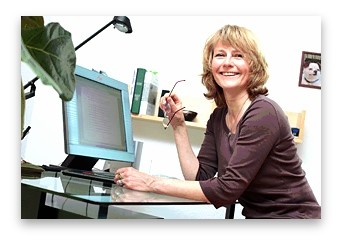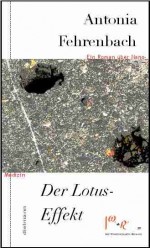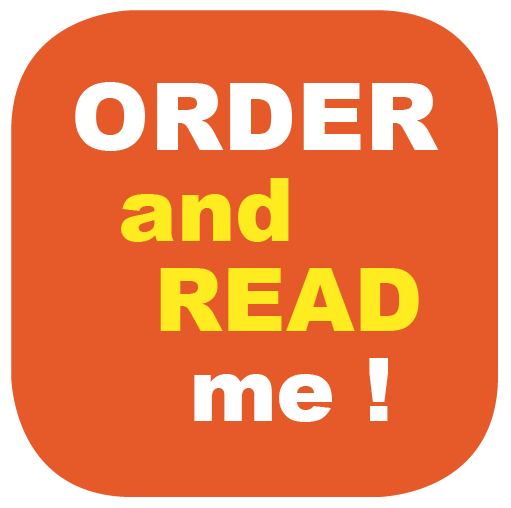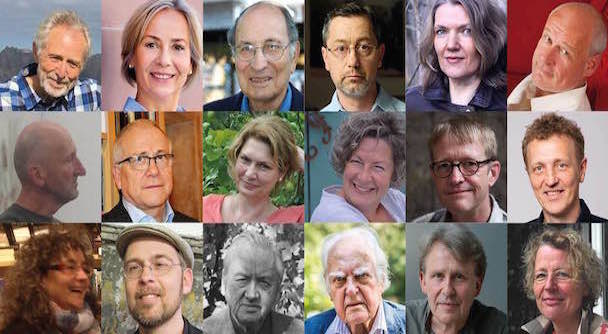Authors & Books
Antonia Fehrenbach

Dr. Antonia Fehrenbach was born in the east of westfelia in 1957. She studied Biology, at first in Strasbourg, later in Freiburg and Cambridge. The plan of becoming marine biologist and journalist, were left behind during her time in Freiburg, instead she became zoologist – she wrote instead of a dissertation as freelance journalist for the »Badische Zeitung«, the »FAZ«, the »TAZ«, the »Sternmagazin« and was responsible for the green page in »Die BUNTE«. She earned a doctorat at the german Primatenzentrum in Göttingen and continued working for the following five years in the biomedical research (Medical university Hannover, Zentrum Anatomie Göttingen, Zentrum inner medicin Marburg). – in 2002 she moved to marburg and took this change of location as an occasion to finally start to write literary.
I have no regrets about the detours I have made, says Antonia Fehrenbach: it was a long time of research, I have seen many laboratories. Enough material, which can be used. She has disbanded active research.
Meanwhile she has become homey with the buisness of writing, which is nicely documented through her homepage: www.antonia-fehrenbach.de

Der Lotus-Effekt
novel about the nanoparticles in the biomedical researche
- Series Science-novels
- Hardcover in linen
978-3-86638-204-6

In the department for toxicology at the university hospital Marburg stranges things are happening: a nightly attack occurs, important data goes missing and a scientists job is not extended although she is right in the middle of a research prject.
Antonia Fehrenbach lets her protagonist, the young biologist and expert on nanoscience Wanda, conduct research at her workplace. Inside and outside of the laboratories Wanda experiences intrigues and mysterious events of death, she is bossed around between Marburg, Berlin, Munich and the USA und gets into political as well as economic interests about the profitable use of nanoparticles in medicin and environment. Only the chance encounter with the student of philosophy Andreas brings her to a lead, that will manifest her own vulnerabilityand allows her to discover, additonally to »her« case, a very personal secret. ...
»Quantnum dots can be made up of upto 100000 atoms«, he continued. »They are tiny solid bodies, but they behave like a single atom. They take up discrete energy states. The cause for this is a surface effect.«
What Georg is trying to explain here, a bit doggerel, was a everyday phenomenon in the nanocosmos: The smaller a particle, the bigger was the percentage of the atoms, that are located on his surface. Even though Wanda did not understand many aspects of nanotechnology, she did realise one thing, the word »nano« was opening up a whole new terrain. It was the discovery of the surface. That ment rethinking – also in toxiology ...
On the background of current developements in nanoscience, this novel deals with the hopes, fears and longings, that people connect with their work. At the same time the nano-theme deals with our understanding of the »surface« and our imagionation of what lies underneath in the depth. The »Lotus-Effekt« is a methapora for the effort about a clean waistcoat in a in the research invironment, where amongst others human traits like vanity, greed and uncertainty are extensively known.
A beautiful summary of the book can be found at Planet Wissen under
Misslungene Nanoexperimente und dubiose Mordversuche (failed nanoexperiments and dubios murder attempts)
»Der Lotus-Effekt« by Antonia Fehrenbach appears to be very realistic: »I wanted to show, that nanoparticles are not yet ripe for the medical-therapeutic department«, said the author, who earned her doctorat at the german »Primatenzentrum« in Göttingen and now is concentrating on writing. Her novel is about a young reseacher, who disovers at the department for toxiology at the university hospital Marburg, that a new nanotherapy is not yet unproblematic: in the experiemnts one laboratory rat dies right after the other. The scientist resarches with some collegues on her own account – and soon gets entangled into the intrigues and murder attemps. However it is not a schoolbook, but a readable crime fiction: The expertise about nanotechnology, financing of the research and the the career opportunities in the laboratories are presented in dialogues, Mails and thoughts and are hence written in everyday language and understandable.








